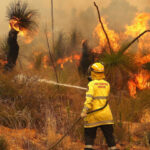SWANNANOA, N.C.—“They’re probably dead.”
That was the thought running through Adam Smith’s mind as he raced to find a way to save his 3-year-old daughter and her mother from the devastation wrought by Hurricane Helene.
Smith, a former U.S. Army Green Beret, spent 17 years conducting military operations around the globe in defense of his country.
He never expected to need those skills to save his family.
“I don’t think anything can prepare you for the thought of losing your child,” Smith told The Epoch Times on Oct. 26, exactly one month after Helene touched down as a Category 4 hurricane in Florida and barreled on toward the unsuspecting mountain communities of western North Carolina.
“Nobody really, truly understands the devastation that’s happened on the ground until you come and drive and see it,” Smith said. “There are towns that are literally gone, swept off the face of the earth.”
Helene claimed at least 102 lives in the Tar Heel State, including 43 in Buncombe County. In the hard-hit community of Swannanoa, clouds of dust still hover in the air as teams of volunteers work to clear the piles of debris.
Traveling through town on Highway 70, the wreckage from collapsed homes, businesses, and bridges paints an apocalyptic scene. But spray-painted among the ruins are messages of hope, strength, and endurance that speak to the resilience of the people who call this area home.
Smith knows something of resilience, having seen it in his daughter, ex-wife, and countless others he has helped through Savage Freedoms Relief Operations, an initiative he launched to assist those affected by Helene. And with the long road to recovery still ahead, that strength will be needed to ensure North Carolina’s hurting communities aren’t forgotten.
The Catalyst
At the Harley-Davidson dealership in Swannanoa, helicopters and military vehicles laden with supplies come and go.
The spot has become an operations center for Smith and his team as they conduct their relief missions.
The parking lot, once home to an array of motorcycles, is now a base camp lined with the trucks and tents of volunteers from across the country who have settled in for the long haul.
Smith glanced in the passenger side mirror of the van he and his fiancée, Taylor Knipp, converted into a makeshift home. He joked that he needed a shave, but the laughter soon faded from his eyes as he reflected on one of the most terrifying events of his life.
“This whole thing just happened organically. I mean, really, it happened from a selfish desire to save my daughter,” Smith said.
He and Knipp were driving home from Texas late on Sept. 26—the day Hurricane Helene made landfall—when he lost contact with his daughter and her mother. When he still couldn’t reach them the next morning, he began to worry.
Disaster Response
Within days of that first rescue mission, Savage Freedoms Relief Operations was born as an offshoot of Smith’s self-defense training company, Savage Freedoms Defense.
“We had special operations volunteers and veterans show up that just came out of the woodwork,” Smith said, noting that people driving by would see them and pull into the Harley-Davidson parking lot.
By Wednesday of the first week, more than 70 volunteers had gathered there to contribute in whatever way they could.
“There was no ego. There was nobody trying to be in charge. There was no one trying to take credit,” Smith said. “And it just grew into that.
“It was a natural occurrence,” said Smith.
At the dealership, Smith’s team established a command center to manage requests for assistance and deploy resources as needed.
In the days following the storm, the group, known locally as the “Redneck Air Force,” scoured the mountains for survivors. Smith acknowledged the efforts of other organizations, first responders, and the National Guard in the rescue operations.
FEMA eventually deployed search and rescue teams, but Smith didn’t see their vehicles until several days after the storm. Despite FEMA’s later supply drop at the dealership, civilian volunteers had already distributed a large number of supplies by that point.
Smith criticized FEMA’s bureaucratic process, calling it slow and inefficient. He hoped for improvements under the new administration and stressed the need to keep disaster relief efforts apolitical.
During Trump’s visit to Swannanoa, he praised Smith for his charitable work, and Smith expressed gratitude for the president’s consideration in not disrupting relief efforts. Smith’s faith was strengthened by the miraculous events he witnessed in the aftermath of the storm.
Reflecting on the emotional impact of Hurricane Helene, Smith noted a profound perspective shift among the local population, with many finding solace in faith. He described the storm’s lasting effects on the community and predicted a rise in spiritual awakening in the region.
The Epoch Times credited Madalina Vasiliu, and the article discusses Smith’s decision to propose to Knipp after a shift in perspective. Smith surprised his crew with the proposal during a nightly briefing, emphasizing the preciousness of time in the face of danger.
Savage Freedoms Relief Operations, despite ceasing rescue operations, continues to offer aid and supplies to those affected by the crisis. The organization is focused on rebuilding homes and addressing housing needs as winter approaches. Smith anticipates challenges in the reconstruction phase, including rezoning issues that may delay the rebuilding process.
To expedite the recovery, Smith suggests bridging private sector efforts with public funding to facilitate quicker solutions. He emphasizes the importance of maintaining awareness and national attention on the ongoing reconstruction efforts in western North Carolina, which will require years and billions of dollars to complete. Please rewrite this sentence. Please rephrase.
Source link






